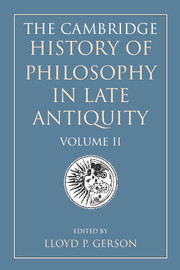Book contents
- Frontmatter
- VI Late Platonism
- VII The third encounter of Christianity with ancient Greek philosophy
- Introduction to Part VII
- 42 Pseudo-Dionysius the Areopagite
- 43 Boethius
- 44 Maximus the Confessor
- 45 John Scotus Eriugena
- VIII Philosophy in transition
- Appendix: List of works of ancient authors
- List of abbreviations
- Bibliography
- Index locorum
- General index
- References
45 - John Scotus Eriugena
from VII - The third encounter of Christianity with ancient Greek philosophy
Published online by Cambridge University Press: 28 May 2011
- Frontmatter
- VI Late Platonism
- VII The third encounter of Christianity with ancient Greek philosophy
- Introduction to Part VII
- 42 Pseudo-Dionysius the Areopagite
- 43 Boethius
- 44 Maximus the Confessor
- 45 John Scotus Eriugena
- VIII Philosophy in transition
- Appendix: List of works of ancient authors
- List of abbreviations
- Bibliography
- Index locorum
- General index
- References
Summary
Eriugena, master of the liberal arts, translator, philologue, poet, philosopher and theologian, developed the most systematic and radical form of Platonism in the Latin West until Maître Eckhart and Nicholas of Cusa – both, directly or indirectly, under his influence. His accomplishment is the more remarkable because made almost entirely without access to non-Christian authors, by drawing out philosophy largely from theological writings – into which genres his own works also almost entirely fall. After Boethius, he was the first to draw together the Greek and Latin Platonisms and the resulting system enabled his reconciliation of Latin and Greek Christian theology. For him the Latin Fathers were foundational – pre-eminently Augustine, importantly crucially Boethius, and also Ambrose. They are contained within a single logical structure with the Greek Fathers, whose writings are known to him and influential even before he made his famous translations. Eriugena’s reconciliation was accomplished by extending the primarily Plotinian and Porphyrian Platonism of the Latins in the direction of crucial notions from Iamblichus, Proclus and Damascius transmitted by the Greeks. The conclusion of Hellenic philosophy John encounters indirectly by way of Boethius, the Pseudo-Dionysius, Gregory of Nyssa and Maximus the Confessor – to name the most influential sources. In general, in the Latin Middle Ages, when the earlier Platonism of Augustine met the later, most authoritatively through the Pseudo-Dionysius, ‘this highest theologian’ (Expos. 4.189), the latter established the encompassing logic. Eriugena established the norm.
- Type
- Chapter
- Information
- The Cambridge History of Philosophy in Late Antiquity , pp. 829 - 840Publisher: Cambridge University PressPrint publication year: 2000



